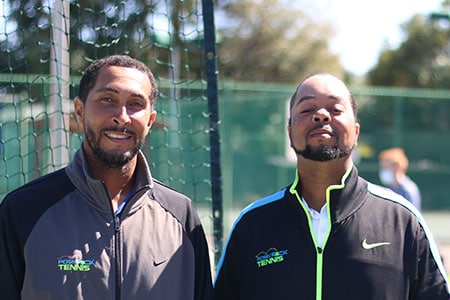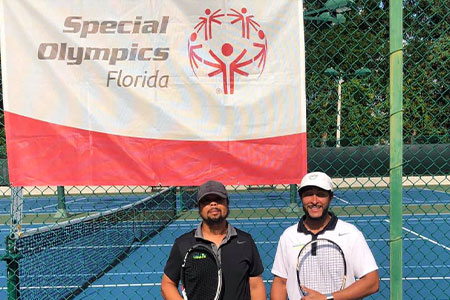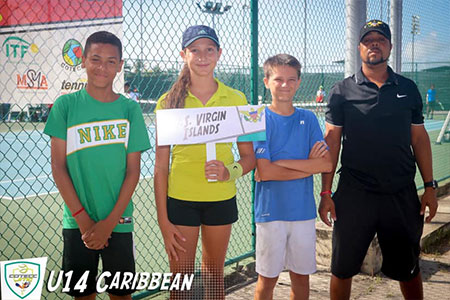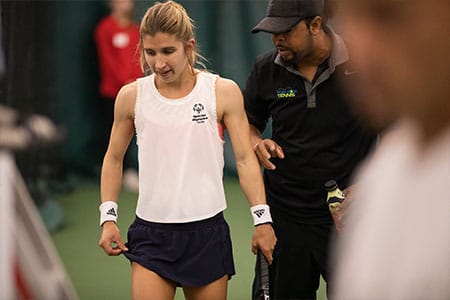USTA Florida is celebrating Black History Month this February by shining the spotlight on members of the vast Florida tennis community. The Richards brothers have a deep roots in Florida tennis, running the only Special Olympics tennis clinics in Orlando, serving on Diversity and Inclusion task forces for both USPTA Florida and USTA Florida, and running their NJTL foundation: Posh Rock Tennis Foundation.


What is your name? John A Richards III and Albert Richards
How old are you? John: Old enough that I have to stretch before and after every time I play.
Albert: 1 year younger than “Old enough that I have to stretch before and after every time I play.”
Birthplace? St. Thomas USVI (Rock City)
Current city? Orlando, Florida
What your current role (job), what you do, and how it is related to tennis?
John: Currently I am the:
President – Central Florida Tennis Management Associates
Director of Tennis – Ft Gatlin Tennis Center
Vice President – The Posh Rock Tennis Foundation (NJTL)
Head Tennis Coach – Special Olympics Florida Orange County
Tennis Coach – Boone High School
(Yeah, I work a lot) Our goal as an organization is to significantly impact our community through the game of tennis.
Albert: Currently I am the:
President/Director of Tennis – Posh Rock Tennis and Posh Rock Tennis Foundation
Vice President – Central Florida Tennis Management Associates (CFTMA)
How did you get involved in tennis? My Dad was an accomplished player and both my brother, and I wanted to follow in his footsteps. My uncle was also a player and an exceptional coach. We were always with them and they did an excellent job of transferring the love and respect that they have for the game to both of us in a major way. They set the foundation for us.
What would you say is your greatest contribution to the sport? John: The greatest contributions that anyone can give to the sport of tennis is two fold.
- Service – The game of tennis gives so much, and it is only right that we find ways to give back to the game that has given us all so much.
- Helping to grow the game. – As an organization and that is exactly what we try to do on an everyday basis. From our grassroots programs that introduce the game to underserved youth, to our Special Olympics Programs for intellectually disabled individuals, to our College Placement program, our goal is to grow the game of tennis in all communities including the ones that are sometimes overlooked and sometimes underserved. Using it as a prescription to create equity.
Albert: Creating pathways for Inclusion- As a term it seems mundane, but as an actuality or eventuality it has done so much for us and the kids we serve. The ability to find something that you like and can excel at, or just like it and can be comfortable where you are with it because people aren’t judging you. Those options give these kids a whole new lease on life, I don’t have to be the best, but I can be if I would like to, I don’t have to run the fastest or jump the highest, but these people are helping me to excel at what I can do. The Foundation gives kids a healthier outlook and that changes perspectives and changes lives.

Does your family play tennis? John: My wife and I play off and on, but as a doubles team we are a work in progress …
Albert: Yes, all my kids play.
Why is it important to celebrate Black History Month in general, as well as in tennis? John: Though I feel that Black History Month should exist outside of a 28 day period, it is important to celebrate because ultimately:
Black history month serves to highlight how black narratives are tightly woven and integrated into the narrative of the United States as a whole. Oftentimes we learn about people whose contributions to society would otherwise have gone unnoticed. This is true for the game of tennis as well. You can’t talk about the history of the game of tennis and not mention Serena, Venus, Arthur Ashe etc. etc. These people are not just footnotes but integral parts of the history of the game.
However, we can’t forget that there are a plethora of African Americans that have made lasting contributions to the game. Though their names might not be as easily recognizable they are deserving of recognition as well.
Albert: Black History is American History.
The idea that people that look, act, think and talk like you have been successful in life and at this game, is important. It’s the Venus and Serena effect. For my brother and I it was the Ashe, Gibson, Washington, Blackman, Harmon, McNeil, Garrison, effect. No disrespect if I didn’t mention you name, your talent was and is as respected as the aforementioned, I’m getting old and maybe a little forgetful. More kids/people, play a sport when they feel like “it’s for them”.
Why is celebrating Black history important to you? How has Black history inspired you in tennis, or, your life in general? John: I read once that “The interaction between a society and its past is an unending one, the interaction is mutual and continuous. History as a body of knowledge encompasses not only the events of the past but also their consequences.” In other words, I must not only be aware of the people/problems that came before me, but I must try to learn as much as I can about what they went through and pay homage to their struggle so that I can not only learn myself but teach that to the next generation. I am in the position I am in because of the struggles that they went through. I stand on their shoulders and now it is my responsibility to teach what I have learned to help the next generation of tennis professionals because that’s what was done for me.
Albert: We grew up on ST. Thomas, in the USVI where we had to learn histories of several different cultures and nations, including our own. Knowing that people like you, have, are and can achieve great things is important to your psyche. We grew up with Black excellence in our house and family, it was ingrained in us. Everyone should at least get the chance to see what it looks like.
Recently the conversation within many industries has been about racial equality, inclusion, and what’s being done to encourage it. How would you like to see these conversations impact the tennis industry? John: I think that the Tennis industry as whole is under excellent stewardship. The USTA, USPTA and ATA are making strides in the right direction regarding these issues. They have recognized that these are areas that need improvement and have collected groups of smart/ dedicated industry professionals to help solve the problem.
I was recently selected to head the National African American D&I Task force for USPTA and joined USTA Florida’s Amplify. I started researching how we could help bridge the gap between the African American Community and the game of tennis. This is what I have found.
There are approximately 14,000 Tennis facilities spread throughout the country, and as of today we have only counted 16 that are managed by African Americans. Those numbers are quite staggering, and our aim is to help change that.
One of our main objectives is to help qualified African Americans with their career advancement. While we have many qualified African American industry professionals, we have very few in management positions ie: (Head Pros, Directors of Tennis, Club Administrators and General Mangers). Currently we are in the process of designing programs to help change that. Much more information to come……
Albert: More inclusivity at the top.
Why is it important to not only support and celebrate other cultures, but be inclusive to all? John: I have always said that diversity and inclusion fosters a more creative and innovative environment. The more you learn about someone’s culture the more you understand it/them, and I believe that the foundation for actual change is real one on one relationships. Real relationships build trust, and trust is the glue that holds people together.
Not only does this make good sense, it’s also good business sense. By helping your company to better understand colleagues, clients, and customers around the world, you also make your workplace a more positive and enriched environment for everyone.
Albert: Everyone deserves a seat at the table.
We come from a hugely diverse culture and family background. It’s why we are so keen on everyone having the ability to participate in the tennis culture. Growth and perspective growth, rarely happen in isolation. Where you stand determines what you see. If you want to be able to see the whole board and maximize your impact on it, then you need to at least be able to hear the voices in the back. It’s the only way to maximize your potential.
You’re both involved in the Posh Rock Tennis Foundation. What is the mission behind your foundation and why did you create it? The Mission of the Posh Rock Tennis Foundation is to change the trajectory of our Central Florida youth, through comprehensive tennis programming that promotes the physical, educational, and life skills necessary to prepare and empower our underserved youth for success.
Our goals are to increase the participation of our underserved youth in the game of tennis, to help develop their character, provide educational enrichment opportunities, provide the ability to make healthy living choices and improve life skills.
We created the Posh Rock Tennis Foundation because quite simply we were these kids and its now our job to reach back and pull up the next generation.
If you’re interested in sharing your own story, experience or suggestions with us, please visit www.USTAFlorida.com/Amplify. To learn more about USTA Florida’s Amplify Project: the long-term initiative to engage and amplify Black voices throughout the Florida tennis community, click here.



